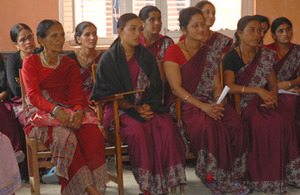Fighting for women’s rights in Nepal
Equalities Minister Lynne Featherstone meets the women who are helping their communities

A paralegal committee meeting in Kavre district, Nepal. Picture: UNICEF
“Women now feel that they can speak out against violence against women and children,” says Kamala, a local volunteer helping in the fight for women’s rights in Nepal.
“As a result of our work, women have become community leaders and are aware of grants that are available to them. We have greater access to justice now.”
Human trafficking and violence against women have traditionally been significant problems in some areas of rural Nepal. But in recent years, with the support of UK aid, groups of local volunteers have formed paralegal committees to help tackle these issues.
Help when it’s needed most
Ambika is one of the many girls who have received help from their local paralegal committees. She was 13 when she got married to a 55-year-old man. A few months later she found out that she was pregnant and her husband pressured her to go for an abortion. When Ambika refused he claimed that the child was not his and started to be violent towards her.
When she was 4 months pregnant Ambika got in contact with her local paralegal committee (PLC), to see if they could help her. The PLC tried to contact her husband, but he failed to show up to any arranged meetings and appeared to have abandoned her.
During the birth there were complications, and Ambika had to undergo an operation to deliver the baby. The PLC raised funds to cover the cost of the operation and supported her to get the birth registered.
After the birth, the PLC arranged for legal support as Ambika made a claim against her husband. After a nine month process, the court mediated the case in the presence of Ambika, her husband and the PLC. The court granted Ambika her property rights, a settlement of land and 200,000 Nepalese Rupees in cash from her husband, which meant that Ambika was able to support herself and her child.
Women who help women
Paralegal committees were established in Nepal in 1999 as a response to the trafficking of women. Since then, they have evolved into community-based groups who prevent and respond to a wider range of violations of the rights of women and children. UNICEF, with the support of UK aid, supports PLCs across 23 districts in Nepal and UK aid has provided ongoing support to 713 existing committees.
“I have been a member of my local PLC since January 2005,” says Kamala. “As a volunteer I act as a mediator in minor community-level disputes, referring cases that cannot be mediated to the authorities. Our group also works to prevent violence against women and children and raise awareness about their rights. This involves organising promotional programmes and home visits, as well as supporting social activities such as the ‘Welcome to School’ programmes, birth registration camps, immunisation and reproductive health camps.”
UK minister visits a local committee
In June 2011 UK Equalities Minister, Lynne Featherstone, visited Nepal in her capacity as the Ministerial Champion for the UK’s international work against gender-based violence.
During her 2 day visit she spent time with a paralegal committee in Kavre district. She met volunteers like Kamala and found out about their work helping victims of violence.
The minister said:
“Every day - in Nepal, the UK and around the world - women experience horrific crimes, discrimination and fear. I am delighted to be visiting Nepal to see firsthand how its government and people are addressing this huge and urgent challenge.”
Facts and stats
Paralegal committees are a key component of the Government of Nepal’s National Plan of Action for the Prevention of and Response to Gender-Based Violence. The Plan of Action was launched by the Office of the Prime Minister in November 2009.
UK aid has supported the establishment of 152 new PLCs in 23 Districts in Nepal and has provided ongoing support to 713 existing PLCs.
Support from the UK government has also provided training for 255 PLCs and refresher training for 260 PLCs.
The PLC members are female volunteers who are selected by local authorities and UNICEF. Women who already play an active role in their community and understand the importance of confidentiality are often asked to volunteer and all the members receive training and are supported by a range of local government organisations.